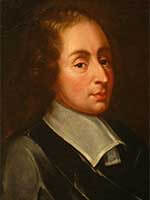
Blaise Pascal
French mathematician, physicist and philosopher
Lived from: 1623 - 1662
Category: Philosophers | Scientists Country: ![]() France
France
Born: 19 june 1623 Died: 19 august 1662
Quotes 1 till 15 of 15.
-
All men's miseries derive from not being able to sit in a quiet room alone.
― Blaise Pascal -
Caesar was too old, it seems to me, to go off and amuse himself conquering the world. Such a pastime was all right for Augustus and Alexander; they were young men, not easily held in check, but Caesar ought to have been more mature.
Pensees (1669)― Blaise Pascal -
If all men knew what each said of the other, there would not be four friends in the world.
― Blaise Pascal -
If all men knew what others say of them, there would not be four friends in the world.
― Blaise Pascal -
It is a deplorable thing to see all men deliberating on means alone, and not on the end.
Pensees (1669)― Blaise Pascal -
Man loves malice, but not against one-eyed men nor the unfortunate, but against the fortunate and proud.
Pensees (1669)― Blaise Pascal -
Men are so necessarily mad, that not to be mad would amount to another form of madness.
Pensées (1669)― Blaise Pascal -
Men despise religion. They hate it and are afraid it may be true.
― Blaise Pascal -
Men never do evil so completely and cheerfully as when they do it from religious conviction.
Pensees― Blaise Pascal -
Men never do evil so fully and cheerfully as when we do it out of conscience.
― Blaise Pascal -
Men often take their imagination for their heart; and they believe they are converted as soon as they think of being converted.
Pensees― Blaise Pascal -
Men spend their time chasing a ball or a hare; it is the very sport of kings.
Pensees (1669)― Blaise Pascal -
The more intelligent one is, the more men of originality one finds. Ordinary people find no difference between men.
― Blaise Pascal -
The sensitivity of men to small matters, and their indifference to great ones, indicates a strange inversion.
― Blaise Pascal -
There are only two kinds of men: the righteous who think they are sinners and the sinners who think they are righteous.
― Blaise Pascal
All Blaise Pascal with men famous quotes and sayings you will always find on greatest-quotations.com





 Andre Weil
Andre Weil